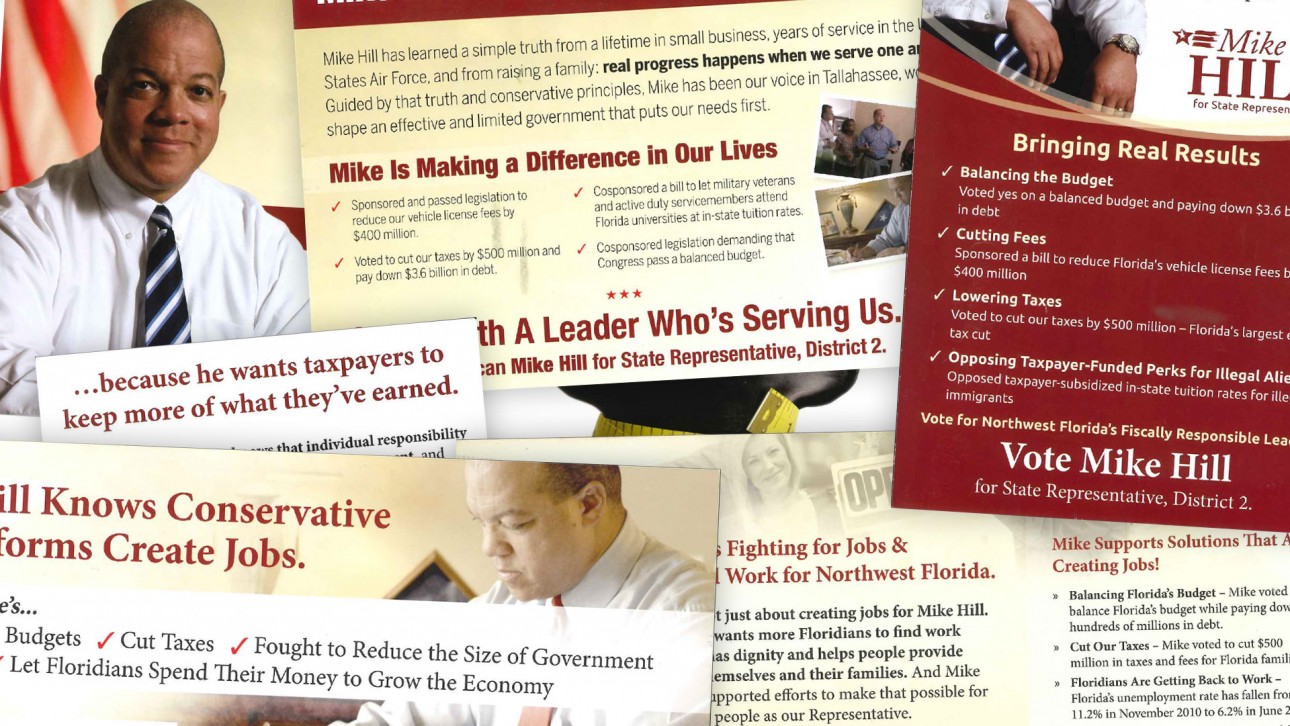Claimbake: Mike Hill edition
- October 23, 2014
- / Joe Vinson
- / community-dashboard

Welcome to the first installment of Claimbake, a recurring feature on Pensacola Today where we will look at claims made by politicians and public officials, parse the meaning behind the words and separate the spin from the truth.
Only specific claims will be evaluated. Claims will be judged on a scale from “Fresh” to “Deep Fried.”
[sidebar]
Claimbake Ratings:
- Fresh: The claim is accurate and presented with appropriate context.
- Mostly Fresh: The claim is mostly accurate, but some relevant details are omitted or obfuscated.
- Breaded: The claim is technically true, but omits important context or key details.
- Fried: The claim misrepresents facts to give an impression that is largely false.
- Deep Fried: The claim is completely false and presented in bad faith.
Claim: Hill “voted to balance Florida’s budget”
This is a major theme in several of Hill’s campaign materials, and it’s accurate to say, as one mailer does, that Hill “voted yes on a balanced budget.” He could have voted no on HB 5003, which implemented the 2014-2015 General Appropriations Act. However, there is no way that Hill could have voted for a budget that was not balanced, because the legislature is constitutionally required to pass a balanced budget. Since a deficit budget was never possible, the claim is misleading. Claim status: BreadedClaim: Hill voted to “pay down $3.6 billion in debt”
While Florida is required to have a balanced budget every year, it is possible for the state to incur debt through capital spending, such as building roads or university buildings, or purchasing land for environmental preservation. Gov. Rick Scott has been touting the $4 billion reduction of Florida’s total outstanding debt since he took office, from $28.2 billion in 2010 to $24.2 billion this year. So where does the $3.6 billion figure come from? It seems to have been lifted from the talking points of Scott’s proposed “It’s Your Money Tax Cut Budget” released back in January:Over the past three years we have laid a foundation of reforms to cut taxes, pay down debt and reduce spending. These pro-growth policies supported the creation of more than 462,000 private sector jobs in our state, and our vibrant economy led to a major drop in our unemployment rate – now below the national average at 6.2 percent. Nearly 3,000 state regulations on families and job creators have been repealed and we have paid down $3.6 billion in state debt.Notice that the claimed $3.6 billion is the cumulative reduction of the three previous years, 2010-2013. Hill only has one legislative session under his belt, the 2014 session. The difference between the two numbers, $400 million, is how much the governor’s office says was paid down in this year’s budget. That’s the only number Hill could reasonably take credit for. One of Hill’s mailers correctly refers to paying down “hundreds of millions in debt,” while two others use the $3.6 billion figure. Claim status: Fried
 CivicCon launches with a look at good growth in cities
CivicCon launches with a look at good growth in cities
 Building stronger brains one baby, one parent at a time
Building stronger brains one baby, one parent at a time
 SCI debuts commercial on Early Learning City
SCI debuts commercial on Early Learning City
 Entrecon: World class speakers and an opportunity to sharpen skills
Entrecon: World class speakers and an opportunity to sharpen skills
 PYP Quality of Life survey 2017
PYP Quality of Life survey 2017
 EntreCon Pensacola 2016: A look back
EntreCon Pensacola 2016: A look back
 Leadership tip: getting better employee takeaways
Leadership tip: getting better employee takeaways
 Leadership tip: be interested instead of interesting
Leadership tip: be interested instead of interesting
 Leadership tip: delivering difficult messages
Leadership tip: delivering difficult messages
 Brain Bags boost Arc, Early Childhood Court programs
Brain Bags boost Arc, Early Childhood Court programs